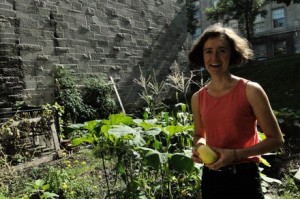Campus Comestibles is a set of four initiatives for four university campuses. Montreal students are working hard to promote urban agriculture and eventually be able to feed themselves thanks to the university’s production. The University of Quebec in Montreal (UQAM) created a series of subversive gardens including the clandestine garden. With the help of the CRAPAUD collective (whose goal is to construct a green and feeding city) and without waiting for any permission, they cleared and planted a series of 3 stripes of soil along the building side. Among other activities, they promote guerrilla farming using vegetation bombs and created a summer class on urban agriculture. The University of Montreal, due to its geographical position on top of the densely vegetated Mont-Royal, occupies a choice site for production. With the ambition of enhancing biodiversity and propagating ancient plants species, they position pot cultures next to the thermal center, a bee yard on one of the rooftops, and mushroom cultures at the foot of the mountain. McGill University has numerous agriculture projects within its campus aiming at diverse objectives. Its 90 square meter garden produces a variety of fruits and vegetables, which are than distributed to NPOs among the city. Other members of the Campus Crops collective see this garden has educational and experimental opportunities for developing new cultivating methods and cultures. They also want to raise political attention on issues like the southern countries’ agriculture and the numerous temporary migrants who come to cultivate Quebec’s fields. They also distribute their production to students’ kitchen and their retails to industrial composters of Montreal. The 205 hectares farm of the MacDonald’s campus, created for agricultural students, is a unique pedagogical project on the island. It produces chickens, pigs, beefs as well as corn and forage cultures. Finally, Concordia University students recuperated the 1966’s greenhouse situated on the 13th story of the Henry F. Hall building. The gardens created on the Loyola campus now host the City Farm School that trains students to maintain the diverse gardens of the school and the ones situated on the rooftop of the congress center.
DESIGNERS: University students
SOURCE: http://cupwire.ca/articles/48258
EDITOR’S NOTE: All these initiatives demonstrate the will and beliefs of the younger generation on urban agriculture, which are not always shared with the higher political or educational spheres that remain reticent to provide funding for these kinds of initiatives.






